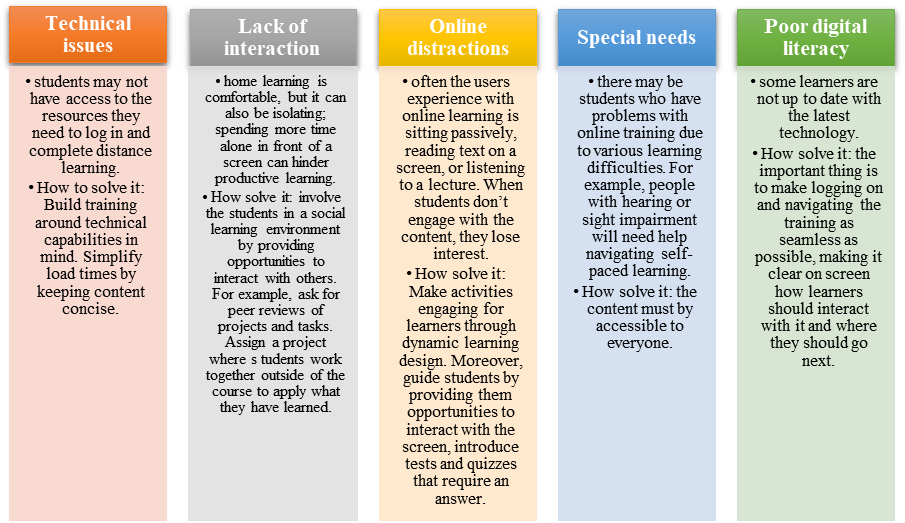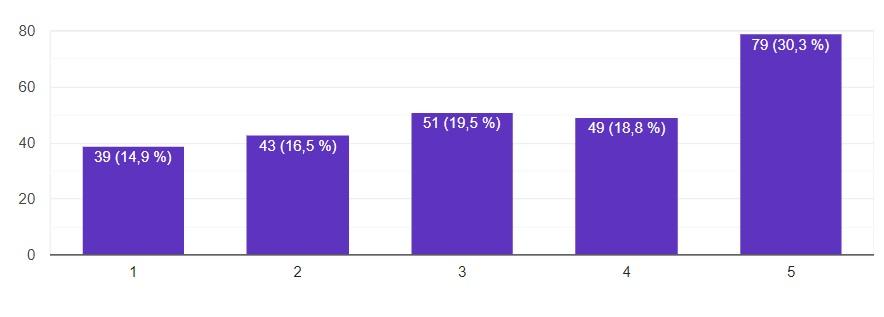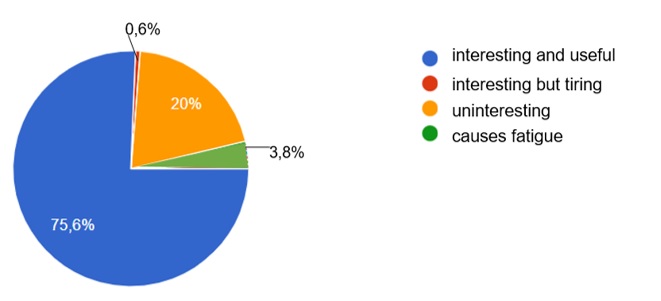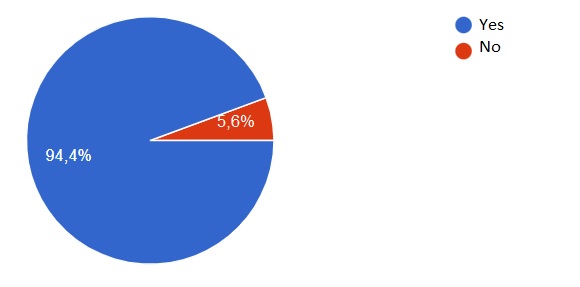Abstract
This paper explores students’ perceptions of the online teaching-learning activities in Higher Education generated of COVID-19 in post-pandemic future. The study presents the results of a recent research using the survey based on a questionnaire applied in the Covid-19 post-pandemic period to a sample 160 students from the University of Bucharest, from different faculties, who have been given a survey Likert-scale. The results of the data analysis show that from the students' point of view, they saw affected their ability to be motivated to complete the tasks, but they did not leave the university. In this sense, the most difficulties were in achieving group work rather than individual work. Measures taken by the University during the period of lockdown were positively appreciated. Research has also shown that good everyday teaching practices can do more to counter student apathy; most students respond positively to a well-organized course taught by an enthusiastic teacher. Most respondents considered that it would be useful for online teaching-learning to remain possible in certain situations, activities are accessible (we have several opportunities to access the information we need to learn: videos, worksheets etc.).
Keywords: Covid-19, higher education, motivation, online teaching-learning
Introduction
In March 2020, schools and universities in the world transitioned to online education in response to the COVID-19 pandemic and intensified the focus on collaboration in online learning. Today, online communication is considered one which we need to embrace.
Technology in education opens up a huge world of possibilities as to how we convey, share, and engage with students presenting different ideas, facts and theories. Innovative technologies not only have the potential to evolve pedagogical practice, but also completely transform entire learning environments. When technology is leveraged with a very strategic vision and change management plan, the results can be revolutionary.
The online teaching-learning
Online teaching
Online teaching is not very easy. Work from home may seem relaxed and amazing, but it’s more difficult than it seems. Technological confidence, identifying learning styles and appropaiate use, self-discipline are prerequisites. Teachers are constantly adapting their teaching and taking into account the learning styles and preferences of their students. With this in mind, it might be a good idea to carry varied activities that engage to visual, auditory and kinesthetic learners at the same time. For example, Tiwari (2020) mentioned a mixed bag of audio links, mp3, recorded tasks, power points, and surveys (using IT tools) can measure up to differentiated learning (Source: https://www.teachingenglish.org.uk/ blogs/madhu-tiwari/challenges-online-teaching).
Variety also helps to break the monotony. Online activities can sometimes be perceived as isolated and lonely. Online sessions can be very valuable for maintaining connections. For example, 10 minutes at the beginning of the day to check in on tasks, say hello, ask about their well-being, any bugs, and explain what they would be doing for the rest of the week, to create a well-being for them and to spark their interest in learning.
Online teaching is considered to have many advantages as itdoesn’t restrict the teacher and student in the binary of timeand space. To some it may seem to be an inexpensive,accessible, and a cinching alternative. It is said to beflexible and convenient both for the students and teachers. In this light the researchers wanted to study what happenedwhen this method was finally used with government schoolstudents in Delhi (Arya & Pooja, 2021, p. 70). The study of authors Mushtaha et al. (2022) assess the impact of the COVID-19 pandemic on users’ (students and faculty members) learning in higher education, and the outcomes of enforcing eLearning to facilitate teaching and learning processes after this unprecedented pandemic and identify the most significant challenges and opportunities the users face. The survey analysis indicated general agreement that the most significant advantage of online learning implementation was its flexibility in place and time, with 77.2% of users providing positive feedback.
Moreover, the accessibility and effectiveness of the assessment and communication methods used showed a positive trend in the hypotheses, 80.3% of the users.
Online learning
Online learning involves a number of challenges that need to be overcome. The opportunities offered by digital technologies go far beyond a temporary solution in times of crisis. For students without safe internet access and / or technology it is most difficult to participate in digital learning; this gap is observed across countries and between income categories within countries. A new OECD PISA report (2020) has highlighted wide disparities both between and within countries about the availability of technology in schools and of teachers’ capacities to use ICT effectively. The students’ access to the digital world is different: on average across OECD countries in 2018, 9% of 15-year-old students don’t even have a quiet place to study in their homes, and in Indonesia, the Philippines and Thailand it's over 30%.
The traditional educational methods were replaced by e-learning when the COVID-19 virus appeared because social gatherings in educational institutions are considered an opportunity for the virus to spread. E-learning is the best option available to ensure that epidemics do not spread, as it guarantees spatial distancing despite the challenges and studied figures, which indicate that students are less likely to benefit from this type of education (Lizcano et al., 2020).
Based on recent article of Pavlou (2021), we present some challenges of online learning, highlighting how they can be overcome (Figure 1).

As state Lei and Medwell (2021) he COVID-19 pandemic has influenced at an unprecedented speed the way we approach the teaching and learning experience. This new situation has tested our ability to deal with unknown technologies in a very short time frame. This was a challenge in many ways, but it was also a learning opportunity to develop our skills in online teaching-learning.
The results of the research by author Tan (2021) highlighted that decreased student motivation and learning performance by resorting to online learning methods during the Covid-19 pandemic.
Based on another study (Duță, 2021) students are not able to concentrate by resorting to online learning methods and weren't sufficiently motivated in period the pandemic. Furthermore, demonstrated good daily teaching-learning practices can help to counter student apathy; students show interest in a systematically planned course, delivered by an enthusiastic teacher who takes a genuine interest in students and supports them to learn effectively.
Other study by authors Cao et al. (2020) examined the impact of the COVID-19 pandemic on Chinese students, found that out of 7143 student participants in the research, 0.9% had severe anxiety, 2.7% had moderate anxiety, and 21.3 % had mild anxiety.
Edelhauser and Lupu-Dima (2020) affirm the COVID-19 epidemic constitute crisis for the complet people, but perhaps a provocation for the educational system and also an incentive for the transition to a new education system.
Distance education experiences have provided valuable lessons over time, through on the importance of directly regulating the instruction system to a variety of realities.
As affirm authors Cooker et al. (2022, p. 13) „our key aim (...) is to explore how learning and teaching might be transformed, for both learners and teachers, as a result of our experiences teaching under the pandemic. (...) the pandemic has reminded us of what lies at the heart of our passion for education, for learning and for teaching”.
The consequences of the Covid-19 pandemic on instruction tends to influence not only learning, but also other social issues such as psychic health, accentuated social inequalities. The response from government, society and development partners has been immediate and crucial, however there are also challenges which must to be treated.
The access to quick digitization, the need developing a new framework for curriculum adapted to online instruction, the consequences negative felt by student, produced by isolation, uncertainty and restlessness, but particularly the growth on abandon rates due to lack of access to online learning, are some of the challenges facing the instruction system caused from Covid-19.
Research Questions
What has been the impact of the pandemic on the students’ performance in terms of learning and teaching?
What is the perception of students about the future expectations of the online teaching-learning?
Purpose of the Study
We have proposed to know that are the perceptions of students on online teaching and learning activities and the future expectations.
Research methods
Participants of the study: was analysed the population of students.
Sample- was collected data from 160 undergraduate students, aged between 18 and 28 years from various faculties of the University of Bucharest.
Instrument- the data were collected through a questionnaire.
Findings
Data analysis of students' perception of online didactic activities in Higher Education provided of COVID-19 in post-epidemic future allowed us to notice that the students are experiencing the lack of motivation and have need to provide attention and teachers' patience. We can observe a reduced motivation with respect to learning activities: strongly agree (5) – 30,3%; agree (4)- 18,8% (Figure 2).

The students are motivated by the atmosphere during classes. The climate is established through some hours interesting and attractive by applying modern working methods (in groups, guided discussions, debates, use of the new technology). The climate need to the same time be relaxed and captivating, and the teacher to manifest enthusiasm and passion.
We notice in Figure 3 the fact that most subjects appreciate online learning activities as being interesting and useful (75,6%) and only a percentage 20% of subjects consider online learning activities as being uninteresting.
How do you appreciate online learning activities?

We note that only a small part of the subjects (3,8%) consider the online learning activities causes fatigue, but at the same time, a 0,6%, appreciate as being interesting but tiring (Figure 3).
Want to know what students' perception of online teaching-learning activities after returning at Faculty we have obtained the following responses: yes (94,4%, 151 of students), no (5,6%, 9 students) (Figure 4).
Do you think that, after returning to Faculty physically, it would be useful for online
teaching-learning to remain possible in certain situations?

The pandemic state may covert into an chance to think again about to framework for curriculum, instruction processes and enchance students ’competency to develop their online learning skills and encouragement their motivation. The COVID-19 pandemic has fast the digitalisation of the instruction system, whereas teachers and students have had to accommodate to the new defiant reality as a effect of the major impact.
Conclusions
From previous studies (Duță, 2021, pp. 33-35), we noticed that students need increased a motivation, aspects that can be most affected and have a immediate relation with the method of learning and carrying out academic activities.
Results of this research, according with recent studies, which confirm that without interaction, motivation and well-being in the online environment, the teaching and learning process will not take place.
Certainly, the activities that a teacher realize to encourage learning will also increase students’ motivation; teacher need understand his students properly, be passionate concerning him lesson and agree all student question as a provocation. For example, activities for the good presentation of technology in institution and overcoming other barriers.
In this sense, teachers who develop digital competences will build a more favorable instruction environment for the learners. Even at critical moments, professors and students mobilized to accomplish everything that was going to be achieved none but in the regular time of study. As suggested in various studies (Sundarasen et al., 2020; Wang et al., 2020) increased incertitude and its effects on learners' academic performances could impact students' psychological welfare.
The results obtained regarding the students' perceptions of the studies affected by the Covid-19 pandemic, demonstrate that the didactic activity, the evaluation process should be regulated and the education system could be reformed by integrating teaching staff into a training system on current issues.
Another solution for reestablishment of educational domain succeeding the pandemic is a improve of the system of training and assessment of teachers, thus that we may have a classroom manage with a high-performance digital system, which would also mean increasing the educational process.
Contributions need to be based on the accomplishment of new initiatives to assistance educational institutions in the recuperation phase, concentrated in particular on providing support to students, „managing learning losses and accelerating digital education, for which recommendations have been given for a smooth transition from home study to face to face courses” (Breslin, 2021, p. 100).
In order that the future of the pandemic is difficult to predict:
We need to develop action strategies for the various scenarios we may face in the future, this occasion can be used to identify the best and most innovative emerging pedagogical practices in online education, to create a pole of expertise on appropriate digital solutions for distance learning. (....) reimagining educational processes during COVID-19 and post-COVID contexts require addressing a host of hardware and software challenges and myths associated with alternative modes of educational processes in general and online/digital education in particular (Rana & Govender, 2022, p. 458).
These research data constitute the necessary premises in the future to improve the work with the students, because a special importance in online teaching-learning activities in Higher Education it is motivation to students.
References
Arya, S., & Pooja. (2021). Teaching Online: Challenges and Questions. Asian Review of Social Sciences, 10(2), 70-74. DOI:
Breslin, T. (2021). Lessons from Lockdown. The Educational Legacy of COVID-19. Francis & Taylor Group.
Cao, W., Fang, Z., Hou, G., Han, M., Xu, X., Dong, J., & Zheng, J. (2020). The psychological impact of the COVID-19 epidemic on college students in China. Psychiatry Research, 287, 112934. DOI:
Cooker L., Cotton, T., & Toft H. (2022). Transforming Teaching, Global Responses to Teaching under the Covid-19 Pandemic. Routledge, Francis & Taylor Group.
Duță, N. (2021). Impact of the Covid-19 pandemic on motivation for learning in the students. Euromentor Journal - Studies about education, XII(4), 27-37.
Edelhauser, E., & Lupu-Dima, L. (2020). Is Romania Prepared for eLearning during the COVID-19 Pandemic? Sustainability, 12(13), 5438. DOI: 10.3390/su12135438
Lei, M., & Medwell, J. (2021). Impact of the COVID-19 pandemic on student teachers: how the shift to online collaborative learning affects student teachers' learning and future teaching in a Chinese context. Asia Pacific Education Review, 22(2), 169-179. DOI:
Lizcano, D., Lara, J. A., White, B., & Aljawarneh, S. (2020). Blockchain-based approach to create a model of trust in open and ubiquitous higher education. Journal of Computing in Higher Education, 32(1), 109-134. DOI:
Mushtaha, E., Abu Dabous, S., Alsyouf, I., Ahmed, A., & Raafat Abdraboh, N. (2022). The challenges and opportunities of online learning and teaching at engineering and theoretical colleges during the pandemic. Ain Shams Engineering Journal, 13(6), 101770. DOI:
OECD. (2020). PISA 2018 Results (Volume V): Effective Policies, Successful Schools. Paris: PISA, OECD Publishing. DOI:
Pavlou, C. (2021). Challenges of online learning - and how to overcome them. Retrieved on May 26, 2022 from https://www.efrontlearning.com/blog/2021/09/online-learning-challenges.html
Rana, U., & Govender, J. (Eds.) (2022). Exploring the Consequences of the Covid-19 Pandemic - Social, Cultural, Economic, and Psychological Insights and Perspectives. Apple Academic Press Inc.
Sundarasen, S., Chinna, K., Kamaludin, K., Nurunnabi, M., Baloch, G. M., Khoshaim, H. B., Hossain, S. F. A., & Sukayt, A. (2020). Psychological Impact of COVID-19 and Lockdown among University Students in Malaysia: Implications and Policy Recommendations. International Journal of Environmental Research and Public Health, 17(17), 6206. DOI:
Tan, C. (2021). The impact of COVID-19 on student motivation, community of inquiry and learning performance. Asian Education and Development Studies, 10(2), 308-321. DOI:
Tiwari, M. (2020). Challenges of online teaching. TeachingEnglish, British Council. Retrieved on Ma 27, 2022 from https://www.teachingenglish.org.uk/blogs/madhu-tiwari/challenges-online-teaching
Wang, G., Zhang, Y., Zhao, J., Zhang, J., & Jiang, F. (2020). Mitigate the effects of home confinement on children during the COVID-19 outbreak. The Lancet, 395(10228), 945-947. DOI:
Copyright information

This work is licensed under a Creative Commons Attribution-NonCommercial-NoDerivatives 4.0 International License.
About this article
Publication Date
10 April 2023
Article Doi
eBook ISBN
978-1-80296-961-0
Publisher
European Publisher
Volume
5
Print ISBN (optional)
-
Edition Number
1st Edition
Pages
1-1463
Subjects
Education sciences, teacher education, curriculum development, educational policies and management
Cite this article as:
Duță, N. (2023). Students' Perception of Online Teaching-Learning Activities: Main Lessons of Covid-19 Pandemic. In E. Soare, & C. Langa (Eds.), Education Facing Contemporary World Issues - EDU WORLD 2022, vol 5. European Proceedings of Educational Sciences (pp. 1305-1312). European Publisher. https://doi.org/10.15405/epes.23045.132

